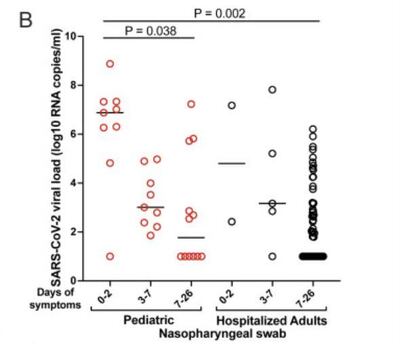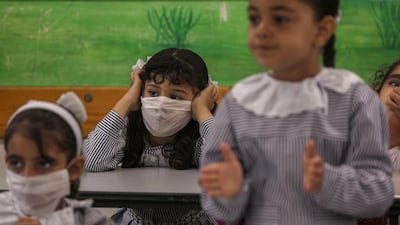Researchers have provided critical data showing that children play a larger role in the community spread of Covid-19 than previously thought.
The study, by Massachusetts General Hospital and MassGeneral Hospital for Children, is the most comprehensive yet into the disease in young people.
In a study of 192 people aged under 23, 49 tested positive for the coronavirus, and another 18 had late-onset of Covid-19-related illness.
The infected people were shown to have a significantly higher level of virus in their airways than adults who were in intensive care units for Covid-19 treatment.
"I was surprised by the high levels of virus we found in children of all ages, especially in the first two days of infection," said Dr Lael Yonker, director of the Massachusetts General Hospital Cystic Fibrosis Centre and lead author of the study.
"I was not expecting the viral load to be so high.
"You think of a hospital, and of all of the precautions taken to treat severely ill adults, but the viral loads of these hospitalised patients are significantly lower than a 'healthy child' who is walking around with a high Sars-CoV-2 viral load."
Risk of contagion is greater with a high viral load.
When young people exhibit symptoms typical of Covid-19, such as fever, runny nose and cough, they often overlap with common childhood illnesses including influenza and the common cold.
This can block an accurate diagnosis of Covid-19, the disease from the Sars-CoV-2 coronavirus, Dr Yonker said.
Researchers also examined the viral receptor and antibody response in healthy young people, those with acute coronavirus infection and a smaller number with "multisystem inflammatory syndrome in children".
Findings from nose and throat swabs and blood samples at the children's hospital have implications for reopening schools, daycare centres and other places with a high density of children in close interaction with adults.
"Kids are not immune from this infection, and their symptoms don't correlate with exposure and infection," said Dr Alessio Fasano, director of the Mucosal Immunology and Biology Research Centre at Massachusetts General Hospital and senior author of the report.
"During this Covid-19 pandemic, we have mainly screened symptomatic subjects so we have reached the erroneous conclusion that the vast majority of people infected are adults.
"However, our results show that kids are not protected against this virus. We should not discount children as potential spreaders for this virus."
The researchers say that children with Covid-19 are not as likely to become as seriously ill as adults, but as carriers with few or no symptoms attending school, they can spread infection and take the virus home.
This is a particular concern for families in certain socio-economic groups, which have been harder hit in the pandemic, and families with vulnerable older adults in their homes.
In the study, 51 per cent of children with acute coronavirus infection came from low-income communities, compared with 2 per cent from high-income communities.
In another breakthrough, the researchers challenged the notion that because children have fewer immune receptors for the coronavirus, they are less likely to become infected or seriously ill.
Data from the groups show that although younger children have lower numbers of the virus receptor than older children and adults, it does not mean they have a lesser viral load.
The authors say this suggests that children can carry a high viral load, meaning they are more contagious, regardless of their susceptibility to developing Covid-19.
The researchers also studied immune response in the multisystem inflammatory syndrome, an infection that can develop in children with Covid-19 weeks after infection.
Complications from the accelerated immune response in the syndrome can include severe cardiac problems, shock and acute heart failure.

"This is a severe complication as a result of the immune response to Covid-19 infection and the number of these patients is growing," says Dr Fasano, who is also a professor of paediatrics at Harvard Medical School.
"And as in adults with these very serious systemic complications, the heart seems to be the favourite organ targeted by post-Covid-19 immune response."
Understanding the syndrome and post-infectious immune responses from paediatric Covid-19 patients is critical for developing the next steps in treatment and prevention, the researchers say.
Early insights into the immune dysfunction in the syndrome should prompt caution when developing vaccine strategies, Dr Yonker said.
As paediatricians, she and Dr Fasano are constantly being asked by parents about the safe return of their children to school and day care.
They say the most critical question is what steps the schools will implement "to keep the kids, teachers, and personnel safe".
Recommendations include not relying on body temperature or monitoring symptoms to identify coronavirus infection in school.
The researchers emphasise infection control measures including social distancing, wearing masks, proper hand-washing and a mix of remote and in-person learning.
They say routine and continued screening of all pupils for coronavirus infection with quick reporting of results is crucial for safely returning to schools.
"This study provides much-needed facts for policymakers to make the best decisions possible for schools, daycare centres and other institutions that serve children," Dr Fasano said.
"Kids are a possible source of spreading this virus and this should be taken into account in the planning stages for reopening schools."
He fears that a hurried return to school without proper planning could lead to a surge in Covid-19 infections.
"If schools were to reopen fully without necessary precautions, it is likely that children will play a larger role in this pandemic," the authors conclude.
The study included 30 co-authors from the two hospitals, Harvard Medical School, Massachusetts Institute of Technology, Brigham and Women's Hospital and Harvard TH Chan School of Public Health.
Entitled Paediatric SARS-CoV-2: Clinical Presentation, Infectivity, and Immune Responses, it was published in the Journal of Paediatrics.

















